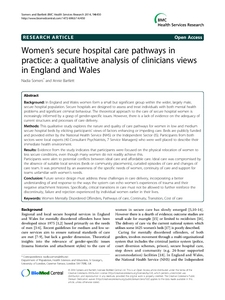Somers, N; Bartlett, A
(2014)
Women's secure hospital care pathways in practice: a qualitative analysis of clinicians views in England and Wales.
BMC HEALTH SERVICES RESEARCH, 14 (450).
ISSN 1472-6963
https://doi.org/10.1186/1472-6963-14-450
SGUL Authors: Bartlett, Ann Elizabeth Adams
![[img]](https://openaccess.sgul.ac.uk/107310/1.hassmallThumbnailVersion/Womens_secure_hospital_care_pathways_practice.pdf)  Preview |
|
["document_typename_application/pdf; charset=binary" not defined]
Published Version
Download (204kB)
| Preview
|
Abstract
BACKGROUND: In England and Wales women form a small but significant group within the wider, largely male, secure hospital population. Secure hospitals are designed to assess and treat individuals with both mental health problems and significant criminal behaviour. The theoretical approach to the care of secure hospital women is increasingly informed by a grasp of gender-specific issues. However, there is a lack of evidence on the adequacy of current structures and processes of care delivery.
METHODS: This qualitative study explores the nature and quality of care pathways for women in low and medium secure hospital beds by eliciting participants' views of factors enhancing or impeding care. Beds are publicly funded and provided either by the National Health Service (NHS) or the Independent Sector (IS). Participants from both sectors were local experts (40 Consultant Psychiatrists, 7 Service Managers) who were well placed to describe their immediate health environment.
RESULTS: Evidence from the study indicates that participants were focused on the physical relocation of women to less secure conditions, even though many women do not readily achieve this.Participants were alert to potential conflicts between ideal care and affordable care. Ideal care was compromised by the absence of suitable local services (beds or community placements), curtailed episodes of care and changes of care team. It was promoted by an awareness of the specific needs of women, continuity of care and support for teams unfamiliar with women's needs.
CONCLUSION: Future service design must address these challenges in care delivery, incorporating a better understanding of and response to the ways the system can echo women's experiences of trauma and their negative attachment histories. Specifically, critical transitions in care must not be allowed to further reinforce the discontinuity, failure and rejection experienced by individual women earlier in their lives.
| Item Type: |
Article
|
| Additional Information: |
© 2014 Somers and Bartlett; licensee BioMed Central Ltd. This is an Open Access article distributed under the terms of the Creative Commons Attribution License (http://creativecommons.org/licenses/by/2.0), which permits unrestricted use, distribution, and reproduction in any medium, provided the original work is properly credited. The Creative Commons Public Domain Dedication waiver (http://creativecommons.org/publicdomain/zero/1.0/) applies to the data made available in this article, unless otherwise stated. |
| Keywords: |
Women Mentally Disordered Offenders, Pathways of care, Continuity, Transition, Cost of care, Health Policy & Services, 1117 Public Health And Health Services, 0807 Library And Information Studies |
| SGUL Research Institute / Research Centre: |
Academic Structure > Institute of Medical, Biomedical and Allied Health Education (IMBE) > Centre for Clinical Education (INMECE ) |
| Journal or Publication Title: |
BMC HEALTH SERVICES RESEARCH |
| ISSN: |
1472-6963 |
| Web of Science ID: |
WOS:000343677000001 |
| Dates: |
| Date |
Event |
| 2014-10-01 |
Published |
|
| URI: |
https://openaccess.sgul.ac.uk/id/eprint/107310 |
| Publisher's version: |
https://doi.org/10.1186/1472-6963-14-450 |
Statistics
Item downloaded times since 29 Jan 2015.
Actions (login required)
 |
Edit Item |


